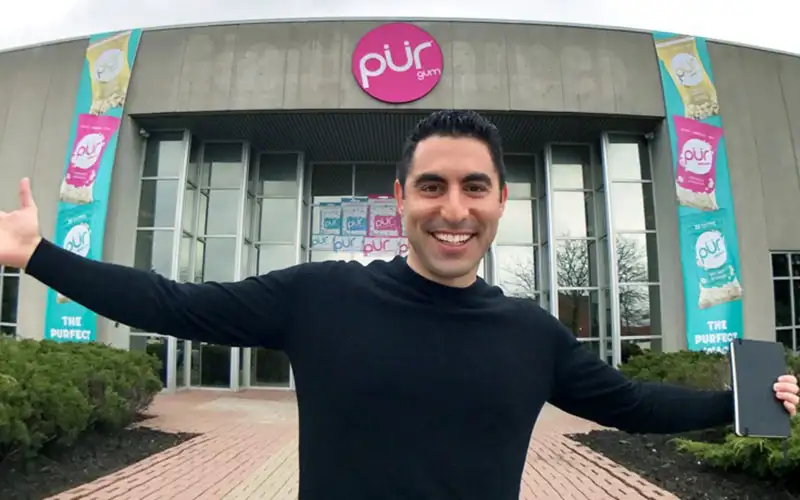Growing PUR: Lessons in Entrepreneurship with Jay Klein
The PUR Company Founder and CEO Jay Klein shares lessons learned in entrepreneurship, growing a small business, and facing the heat of the Dragons’ Den.

Table of Contents
Seven years ago, PUR Gum began as an internal marketing exercise. Today, it has grown to 50,000+ distribution points globally, and is now taking a bite out of the healthy snacks market. Here, The PUR Company Founder and CEO Jay Klein shares lessons learned in entrepreneurship, growing a small business, and facing the heat of the Dragons’ Den.
The idea for PUR Gum grew out of a marketing business that The PUR Company founder and CEO Jay Klein started out of university. In an effort to understand his customers’ business and branding challenges, he and his team undertook an internal exercise to develop a fictitious product and go through the same process as their customers. The product they created eventually became PUR Gum, which Klein says innovates on traditional chewing gum by “kicking aspartame,” meaning that it is free of aspartame, artificial and chemical ingredients.
Back in May 2010, in the brand’s infancy, PUR had no distribution. In its first month, recalls Klein, the product launched in 33 retailers, and in the second month, they were up to 100 stores. Seven years later, the brand has grown to over 50,000 points of distribution all over the world. What began as a chewing gum company has expanded, introducing mints in 2015 (kicking more aspartame), and more recently, popcorn.
“Each step of the way, our team has learned and adapted to the situation of our growth. We’ve learned different distribution models, we’ve learned different operational challenges, and we’ve worked together to build this incredible brand. And that’s largely driven by our amazing team,” says Klein.
In 2014, when the PUR business was already performing well (doing about $10 million in revenue, according to Klein), he successfully pitched on Dragons’ Den. The reward – confirmation that the Dragons liked PUR’s brand and unique selling points – outweighed the risk of rejection by the Dragons, says Klein. The Dragons, in their feedback, said that Klein demonstrated entrepreneurial success through building a solid brand and business model, and learning from setbacks.
“The most important thing is to know your business and show your passion,” says Klein. “That’s what people invest in.”
Read on for his lessons learned in entrepreneurship, keeping employees engaged, and facing the heat of the Den.
Creating a different kind of product
Q: Take us back to selling that first pack of gum. How did everything come together?
Jay: Our goal was to sell one pack of gum to a stranger. It’s very easy to sell a pack of gum to someone who loves you or cares about you, but creating a purchasing experience from someone who sees a product, identifies with it and wants to buy it is a very big challenge. You have to create a brand that’s unique enough, and then you have to create unique selling points so that people migrate towards your product.
In May of 2010, when we put that product in stores, we were able to get that first customer confirmation that they’re interested in what we do.
I probably camped out at the store, just watching that box of gum sit on the counter until the one person bought a pack of gum. And then when I jumped on them and gave them a big hug, they didn’t know where I was coming from, so it was pretty funny.
Expanding the business
Q: How did you go about expanding the brand beyond chewing gum, and what did you learn?
Jay: We listened to the demands of our consumers wanting more, and asked what else we could Kick Aspartame® with. So, we introduced PUR Mints. Then our consumers wanted better-for-you products – simple substitutions with no compromise in taste or quality. We’ve moved into the snacking world [with PUR popcorn].
What we’ve learned from our expansion – and where we grow in the future – is connecting a trusted brand with consumers, so that when they see the PUR logo on a product, they know it’s made from the best ingredients, it’s fairly priced, and they’re going to enjoy it.
Q: How does a company like yours stand out in a sea of competitors – both the big-name brands that have been around for years, and the smaller specialty companies?
Jay: We have unique branding and we come to market in a unique way. We want to follow the consumer that enjoys our product and match our distribution with their lifestyle. We really understood who our customer is, what they’re looking for in a product and where they go. So, PUR is always there.
From a business standpoint, we stand out because we weren’t afraid to invest in our brand. If a retailer wanted to try our product, we made it possible for them to try it. We had no minimums. If they wanted to take one, we would give them one. Just creating that connection and the willingness to give the consumer a chance to buy our product is what we’ve always made possible. And we still encourage our team to do that today; just give us a chance and let us work hard to make it happen.
Keeping the team engaged
Q: What makes an amazing team?
Jay: People who are really willing to try. And we push everyone to not be afraid to fail, to make mistakes, go outside of [their] comfort zone, and have a vision to do something great. We can’t grow at 200% or 300% a year if everyone’s only putting in 75% effort. We have a great group of like-minded individuals that want to make change and see something different happen in the marketplace.
Q: How do you make sure that you’re keeping your employees happy and engaged?
Jay: By providing free chewing gum and chairs to sit in [laughs]. We do a lot of employee engagement, things like “Wellness Wednesdays.” We’ll be going on our first company retreat, where we’re bringing all of our team together from across the U.S. and Canada to meet, spend time together, and build the bonds that they create over the phone and over email.
We have six values and we look for our team members to exude [them] and share them with each other. So, we have a peer-to-peer program, where our team members can share a card that highlights a value that someone has demonstrated throughout the month. They write a personal note on it, and it’s a nice compliment from peer to peer.
Related: Employee Engagement Matters in Small Business Too
Lessons in entrepreneurship
Q: What was the journey that brought you to where you are today?
Jay: When I graduated school, I knew that I didn’t want to go into an overly structured environment. What I chased was independence. I wanted to have the freedom to make my own decisions and figure out what I wanted to do in life. So, as I became an entrepreneur and I started the marketing business, it allowed me to exercise my creative ideas through other people’s vision and figure out how we can tell their stories. I tried that with Bonus Gum, which is a product we launched before PUR, and I knew nothing about the chewing gum industry, I knew nothing about supply chain, distribution, or any of the complicated elements of a consumer brand.
I made a lot of mistakes and lost a lot of money. But what I’ve learned the most is not to give up – tweak the idea to a point where it might work. We really started small with PUR. We went door-to-door to the independent retailers and sold our product on a peer-to-peer level. As we educated consumers about why The PUR Company needed to exist and why our product was relevant in the marketplace, it allowed us to build this broad foundation, which is what we stand on today.
Q: You rebranded and then fought to come back up. Why?
Jay: I think that when you get to a transition point in business and you’re surrounded by great people, as a leader, you don’t want to fail for anyone. So, you really kick into another gear and figure out how to be successful. You’re not only being successful for yourself, but this is something that you do for all the people around you.
Q: What is fulfilling about running your own company?
Jay: What makes me most proud is watching a consumer enjoy one of our products. They don’t chew gum, they chew PUR, and that is just a confirmation of all the hard work that so many people have done over the years – that we’ve been able to connect with them and create a product that they believe in, trust and enjoy. And that’s why we work hard, that’s why we push ourselves to become a great business.
Learn about creating a business plan: Download the Small Business Start-Up Guide
On growing a small business
Q: What has the growth trajectory of the business been like?
Jay: It was a slow progression of figuring out what we need, and that went from sales to logistics to accounting, and you scale. Today, we’re almost 60 people. We have people in two countries and we have a much more robust organization. We’ve done a lot more in terms of structuring and looking at 2018 and 2019, which are things that we never did [at the beginning] because we were focused just on today. And now, we’re a much larger organization that has to plan for a future.
We faced a lot of challenges growing, and I think personnel challenges are the biggest challenges you face because every day, our business is about dealing with people. We got to a point where we were doing a lot of business with a very skeletal team and everyone was being pulled and worked as hard as [they] could.
We had a major transition point when we brought on a head of people and culture. That was really [when] we structured our hiring, our onboarding, and more of the process-driven things that welcome someone to a new company, train them to be successful and to set them up to do good things.
Q: As you’ve grown, how have you dealt with challenges from a people standpoint?
Jay: There’s a lot of pain points you run across as an entrepreneur. Not knowing where to source things, how to get things done administratively, payroll, dealing with challenges you don’t know. We’ve been fortunate to grow at this accelerated rate by putting our trust in partners.
We know our strengths and we try and partner with people that can deliver in areas where we need support. When we bring on great partners, it gives us the confidence that we can focus back on what we do well, and that’s make a great product and deliver it to the consumer. The partners allow us to run our business operationally so we don’t have to focus on those tasks.
Q: What makes a good business partner?
Jay: I think a great partner in business is one who’s always there when you need them, but you don’t know that they’re there operationally. We want invest our time, make a decision, and then just get the result. We’re not interested in the process because the process that we do well is make great products.
Q: What keeps you up at night?
Jay: My job is to keep everyone motivated, enthused, energized, and translate my vision of what I hope this business could become and match it with their skill sets. I care so much about our people and the values that we’re sharing with our consumers, and I don’t want let anyone down. So, that’s why I don’t sleep. I have really comfortable sheets. So, that helps.
Hear Jay’s advice for facing the Dragons on Dragons’ Den:
You may also like:
Ready to get started?

